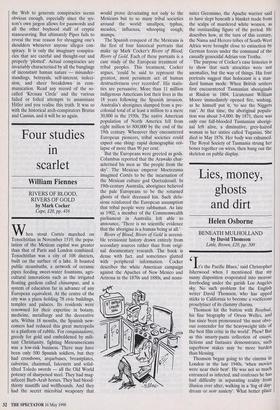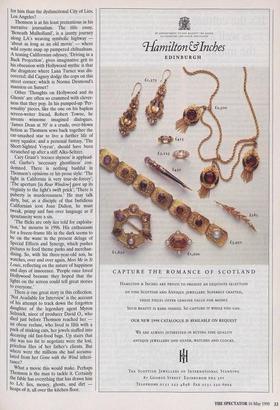Lies, money, ghosts and dirt
Helen Osborne
BENEATH MULHOLLAND by David Thomson Little, Brown, £20, pp. 300 It's the Pacific Blues,' said Christopher Isherwood when I mentioned that my sunny disposition evaporated into morose foreboding under the garish Los. Angeles sky. No such problem for the English writer David Thomson, who has upped sticks to California to become a vociferous proselytiser of its clammy charms.
Thomson hit the button with Rosebud, his fine biography of Orson Welles, and has since been pronounced 'the most obvi- ous contender for the heavyweight title of the best film critic in the world'. Phew! But as this smarty-pants collection of essays, fictions and fantasies demonstrates, such superbrow stakes may be more burden than blessing.
Thomson began going to the cinema in London in the late 1940s, 'when movies were near their best'. He was not so much entranced as infected, and confesses he has had difficulty in separating reality from illusion ever after, walking in a log of day- dream or noir anxiety'. What better place for him than the dysfunctional City of Lies, Los Angeles?
Thomson is at his least pretentious in his narrative journalism. The title essay, Beneath Mulholland', is a jaunty journey along LA's weaving symbolic highway 'about as long as an old movie' — where wild coyote snap up pampered Chihuahuas. A teasing Californian odyssey, 'Driving in a Back Projection', gives imaginative grit to his obsession with Hollywood myths: is that the drugstore where Lana Turner was dis- covered; did Cagney dodge the cops on this street corner; which is Norma Desmond's mansion on Sunset?
Other 'Thoughts on Hollywood and its Ghosts' are often so crammed with clever- ness that they pop. In his pumped-up 'Per- sonality' pieces, like the one on his hapless screen-writer friend, Robert Towne, he invents winsome imagined dialogues. `James Dean at 50' is a crude, over-blown fiction as Thomson sews back together the car-smashed star to live a further life of sorry squalor, and a personal fantasy, 'The Short-Sighted Voyeur', should have been scrunched up after a stiff Alka-Seltzer.
Cary Grant's 'rococo shyness' is applaud- ed, Garbo's 'necessary ghostliness' con- demned. There is nothing bashful in Thomson's opinions or his prose style: 'The light in California is very tour-de-forcey'; `The aperture [in Rear Window] gave up its virginity to the light's swift prick'; 'There is puberty in murderousness.' He may talk dirty, but, as a disciple of that fastidious Californian icon Joan Didion, he must tweak, primp and fuss over language as if spontaneity were a sin.
`The flicks are only lies told for exploita- tion,' he mourns in 1996. His enthusiasm for a freeze-frame life in the dark seems to be on the wane in the present deluge of Special Effects and Synergy, which pushes pictures to feed theme parks and merchan- dising. So, with his three-year-old son, he watches, over and over again, Meet Me in St Louis, reflecting on the nature of happiness and days of innocence. 'People once loved Hollywood because they hoped that the lights on the screen could tell great stories to everyone.'
There is one great story in this collection. Not Available for Interview' is the account of his attempt to track down the forgotten daughter of the legendary agent Myron Selznick, niece of producer David 0., who died just before Thomson reached her an obese recluse, who lived in filth with a pack of stinking cats, her jewels stuffed into decaying old fast-food bags. Up stairs that she was too fat to negotiate were the lost, priceless files of her father's clients. But where were the millions she had accumu- lated from her Gone with the Wind inheri- tance?
What a movie this would make. Perhaps Thomson is the man to tackle it. Certainly the fable has everything that has drawn him to LA: lies, money, ghosts, and dirt heaps of it, all over the kitchen floor.



























































 Previous page
Previous page